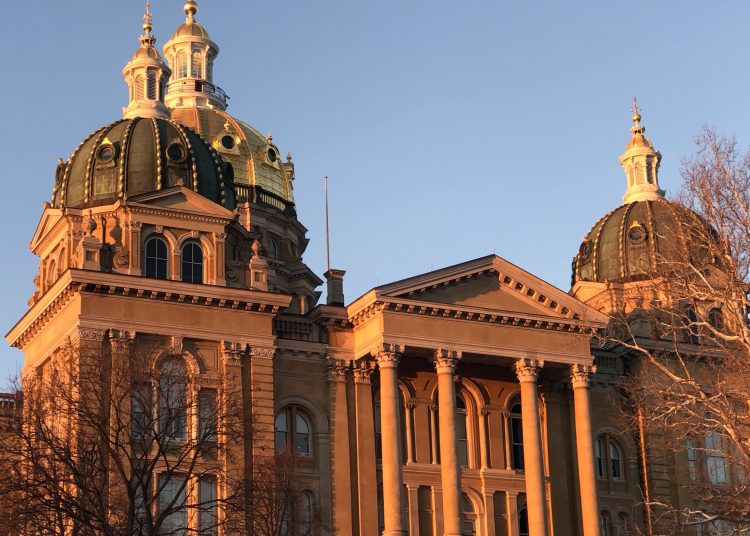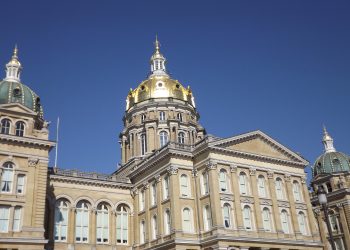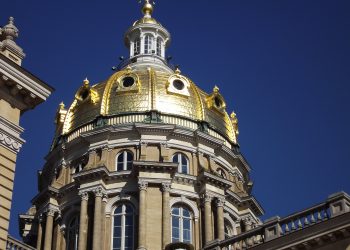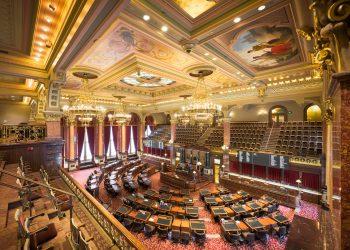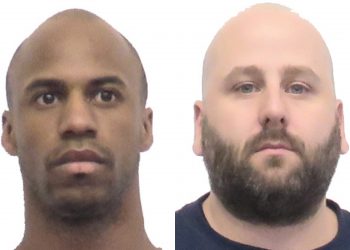DES MOINES, Iowa – Two religious liberty bills passed out of their respective committees in the Iowa House and Iowa Senate, surviving the first funnel week.
HSB 677 (now numbered HF 2437) passed unanimously out of the Iowa House Judiciary Committee on Tuesday. On Tuesday, the Iowa Senate Local Government Committee passed SF 2170 (now number SF 2284) by a party-line 7 to 4 vote.
Both bills prohibit a governmental entity from burdening a person’s free exercise of religion. Both also prohibit governmental entities from treating religious conduct more restrictively than any secular conduct of reasonably comparable risk or treating religious conduct more restrictively than comparable secular conduct because of alleged economic need or benefit.
The bills were a response to COVID-19 restrictions seen in other states where churches were shut down, but other businesses, such as casinos in Nevada, were allowed to stay open.
During the Iowa House Judiciary Committee, State Rep. Skyler Wheeler, R-Orange City, was asked if this addressed a problem in Iowa. He acknowledged that the bill was meant to prevent that from happening.
Both bills also provide that a person whose free exercise of religion has been burdened in violation of the bill may assert that violation as a claim or defense in a judicial or administrative proceeding, and provides that the governmental entity may be liable for actual damages, attorney fees, costs, and other appropriate remedies. The bill also allows the person to obtain injunctive relief against the governmental entity.
However, the bills differ in certain respects.
The Iowa Senate bill includes language modeled after the federal Religious Freedom Restoration Act. SF 2284 provides that a governmental entity shall not substantially burden a person’s free exercise of religion unless the governmental entity can demonstrate that the action constituting or resulting in the burden is in furtherance of a compelling governmental interest and is the least restrictive means of furthering that interest.
The Iowa House bill does not include that language. Instead, it prohibits a county or city from enacting a private or civil law that would burden a person’s free exercise of religion.
During the Iowa Senate Local Government Committee, State Senator Rob Hogg, D-Cedar Rapids, opposed the bill because he sees it as a vehicle “to enable discrimination against people based on sexual orientation or race or other reasons.”
He said citing the late Supreme Court Justice Antonin Scalia in Employment Division v. Smith that the bill “would open the prospect of constitutionally required religious exemptions from civic obligations of almost every kind, ranging from compulsory military service to the payment of taxes to health and safety regulations, such as manslaughter and child neglect laws, compulsory vaccination laws, drug laws, and traffic laws to social welfare legislation such as minimum wage laws, child labor laws, animal cruelty laws, environmental protection laws, and laws providing for equality of opportunity for the races.”
State Senator Dennis Guth, R-Klemme, countered that similar language had been included in federal law and 31 different states.
“It’s not been a problem,” he said.
State Senator Craig Williams, R-Manning, agreed.
“Agreed. I think most people just want to be able to go to church and exercise their religion. The First Amendment, we all think, gives us that right to do, and yet we saw in California, in the state of Illinois, governors shutting down churches while keeping other businesses open. And we’re going to stop that,” he said. “It’s unfortunate to me that we even have to have this type of a bill before the Iowa Senate here and because we should be able to rely on our constitutional rights for freedom of religion, and apparently we can’t do that. 31 other states in the federal government also have this law. And I don’t see a problem with it. I’m going to pass it.”
State Senator Julian Garrett, R-Indianola, said the bill does not do what Hogg claimed it does.
“Exactly what does the bill say? You can’t treat religious conduct more restrictively than comparable secular conduct doesn’t say you can eliminate secular conduct if you have a claim of a religious principle, it says you can’t treat religion more restrictively,” he said.
“You can’t substantially burden a person’s exercise of religion fundamental constitutional right unless applying the burden to that person’s exercise of religion, in a particular situation, is essential to further a compelling governmental interest,” he added. So if it’s essential to compelling a fundamental governmental interest, the bill doesn’t say you can’t burden religion. And it goes on to say, under those circumstances, whatever burden or limitation you’re putting on religion has to be the least restrictive means of furthering that compelling governmental interest. Now, what’s so awful about that? That’s altogether a different standard than what we heard from Senator Hogue just a little bit ago.”
Garrett reiterated to The Iowa Torch in an email that what the Democrats warned about has not happened due to the bill’s language at the federal level or in the states that have adopted that language.
“The bill actually provides a balance between legitimate government activity and the exercise of fundamental constitutional rights,” he said.



